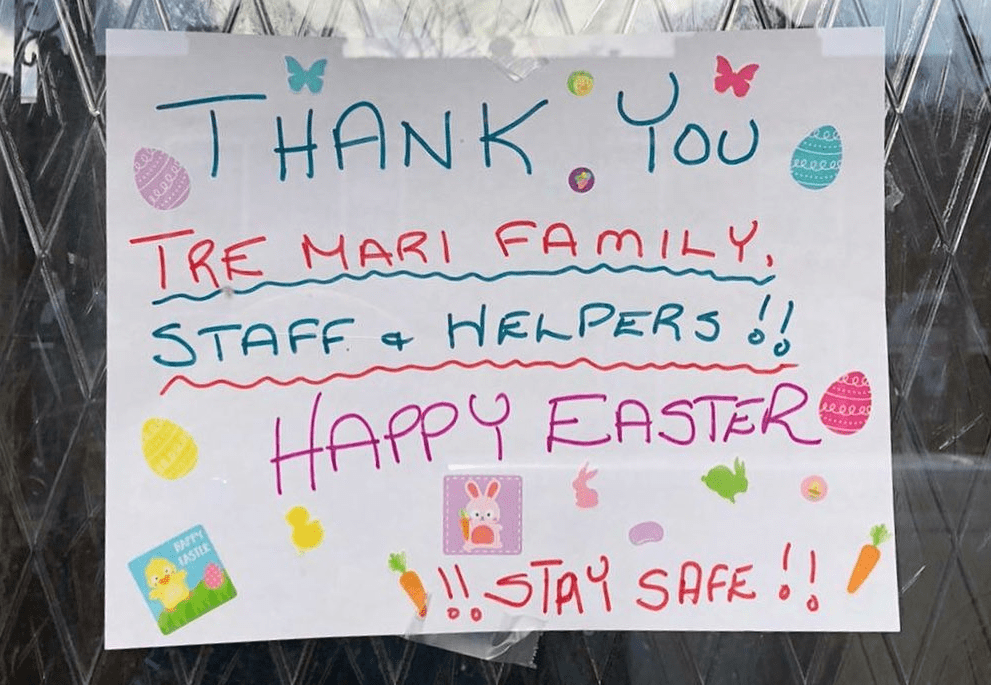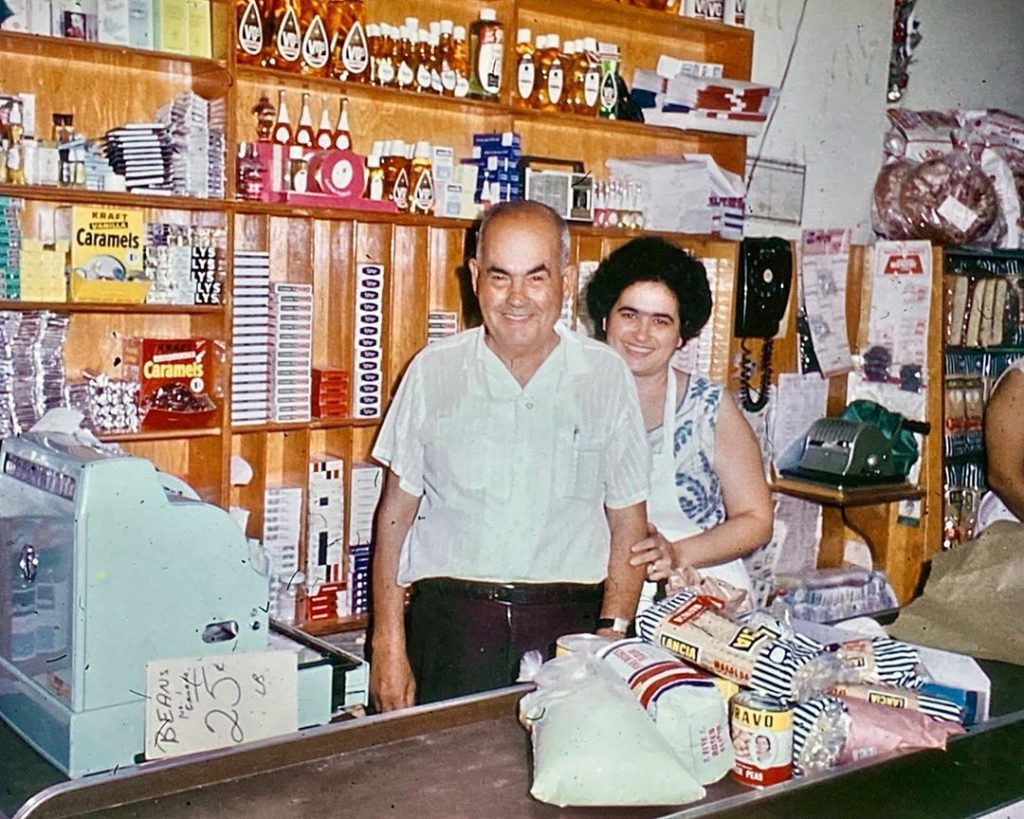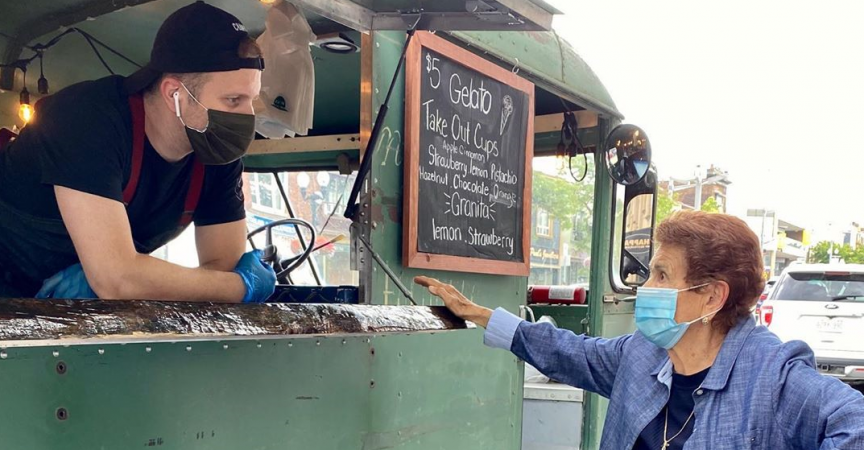Leveraging Local During COVID-19: How local communities are helping to support small business
Growing up in Toronto’s Corso Italia area, Saturdays were spent at the Piccininni Community Centre for swimming or ballet, followed by a ‘latte’ and cannoli at Tre Mari Italian Bakery. Of course, being six my latte contained no caffeine and was instead steamed milk that my parents told me was a “special latte for kids”. Nevertheless, Saturdays were a treat for me and Tre Mari was a part of my childhood. Now as an adult, Tre Mari has once again become part of my life. As quarantine hit, weekly orders of my favourites became part of my routine.
Prior to COVID-19, Tre Mari’s team consisted of 30 – 35 employees (which included bakers, front of house, pastry chefs, and cake decorators). The Tre Mari space featured a small indoor sit down area in addition to a small outdoor patio, a hot food counter, a bakery counter, and a grocery section with an antipasto bar, freshly baked breads and Italian pantry staples.
When lockdown orders came down in Ontario, Tre Mari shut their doors. However, all was not lost. Receiving messages from regulars inquiring about delivery pushed them to start taking orders.
Three days after closing up shop, Tre Mari began to take orders online, using Instagram to highlight their offerings and spread awareness. Through Instagram, the team was able to quickly and easily communicate with consumers and answer any questions. They launched free home delivery in the local area (executed in house by the core team) and within three days, were able to deliver a customer’s order. Tre Mari brought their signature cannolis, Italian buns, and prepared foods directly to consumers’ doors.

Prior to lockdown, Tre Mari hadn’t offered delivery. In fact, they hadn’t offered home delivery since the 60s, and so this return to the ‘old ways’ was an interesting mix of modern and traditional, much like the Tre Mari team itself.
Tre Mari began in 1960 as a small bakery and store and has remained to this day, a family operation. I spoke to Franco, whose grandparents Jim and Mary Deleo opened the bakery, his parents then took over the operation and after the passing of his father, Joseph, his mother, AnnaMarie took over the reins with help from her children. The brothers, Franco, John Paul, and Alessandro have been pivotal in bringing Tre Mari into the 21st century, and in making operational changes to fit our COVID-19 ‘new normal’.
Franco himself is in charge of executing the bakery’s social media strategy. As a photographer, he’s able to grab professional product shots. His husband comes from a marketing background and also pitches in, even helping the bakery rebrand itself. Take a look at their Instagram account and you can see how they’ve been able to blend the old and new together. They feature customers on their feed; smiling nonnas with captions of how they’ve been visiting Tre Mari since the 60s. Franco speaks about how, when lockdown orders were brought down in March, they began to receive calls from their loyal base of regulars asking for their usual orders.
Like Lazy Daisy Cafe, and many other operators, Tre Mari saw the consumer demand for pantry and produce, as supermarkets sold out of items like flour, yeast, canned goods, eggs and milk. In addition to the prepared dishes, Tre Mari began providing these ingredients. As quarantine continued, Tre Mari took note of how consumer tastes and habits had changed. They saw how time was spent indoors, exploring new hobbies and the team wanted to capitalize on this shift. As families needed to occupy kids, they put together cooking activity kits to build pizzas and cannolis. As initiatives progressed, Tre Mari was able to bring back some staff and the lean team of eight was agile enough to move quickly. Bringing together ideas like the activity kits, or selling raw materials easily and smoothly.
Their adaptable team demonstrated their quick-thinking again with the launch of their online ordering system. Prior to COVID-19, Tre Mari didn’t have an online shop – it wasn’t really needed. But taking in orders via email, phone, and social media was a little overwhelming and ineffective – they needed a more streamlined process for gathering all the information and delivering orders.

They turned to Shopify and within two weeks, the team had built a professional, user-friendly website. It was a quick turnaround time that had Franco and the team cataloguing and photographing every product they would have available online for order – almost 1000 items. Adding to this, some backend coding was needed to finish the site – something they took on themselves.
For a mom and pop operation from the 60s, this online venture also forced them into operating in a more modern way. They had been using older cash registers but now, they needed to be able to seamlessly connect their system for proper inventory, therefore pushing them into upgrading their POS systems with something newer.
While still managing their delivery inhouse, the team works within a three day window for deliveries and offers delivery on Tuesday, Thursday and Saturday. They’ve been able to now bring back a few more of their staff – bringing them to a team of eight. Aside from the obvious bottom line benefits of their delivery program, Franco was able to leverage content from deliveries for a new social media campaign. When customers organically began leaving signs and notes for the Tre Mari team thanking them for the order, Franco would snap photos and post them on their Instagram story, prompting others to do the same.
Seeing the ‘thank yous’, it was clear to Franco that just keeping their doors open throughout the pandemic had meant so much to the neighbourhood. Throughout the years, Tre Mari has been a staple in the Corso Italia area. It’s the spot where they grab an afternoon latte with their parents, their go-to for birthday cakes, or the place where they pick up buns and mortadella for park picnics. For years Tre Mari has been integral to the vibrancy of St. Clair West. Calling attention to this, Tre Mari has supported various community initiatives for years. Franco speaks about the numerous neighbourhood festivals they’ve worked with, and the yearly St Clair’s Best Authentic Soppressata Contest they hold in the alley behind the bakery.

Spending decades building this relationship with the neighbourhood meant that throughout quarantine, Tre Mari found incredible and immense support from the community which helped carry them through this uncertain and precarious time. The foodservice industry has been devastated by COVID-19, and while affected by the pandemic, Tre Mari has been able to grow and evolve – something that many larger operations have been unable to do.
This summer for example, Tre Mari introduced a gelato and granita truck in front of the shop. Another Corso Italia fave – DeSoto’s, a bistro on St. Clair lent a vintage truck to Tre Mari which they outfitted with a generator to sell their summertime treats.
“The amount of love and support from our community has been overwhelming,” says Franco. “We’ve really managed to stay operational because of them. The outpouring from our neighbourhood has been so wonderful.” He also adds that the pandemic has forced their team to be creative and innovative in the face of adversity: “With a lot of the new programs and initiatives, we’re seeing such positive results that we’re wondering why we never did it before.”

As we see so many of our Toronto favourites close shop, it’s bittersweet to see other operations successful work through the pandemic. The outcome from COVID-19 should not be understated. In April, Restaurants Canada reported that nearly 1 in 10 independent restaurants have already closed permanently and 1 out of 2 remaining independent restaurants don’t expect to survive if conditions don’t improve.
It can be hard to see the light when we’re challenged by issues beyond our control. Nevertheless, the story of Tre Mari brings to light two things that give our industry hope; that restaurants are the cornerstone of communities and that operators are resilient.
It can be hard to see the light when we’re challenged by issues beyond our control. Nevertheless, the story of Tre Mari brings to light two things that give our industry hope; that restaurants are the cornerstone of communities and that operators are resilient.









